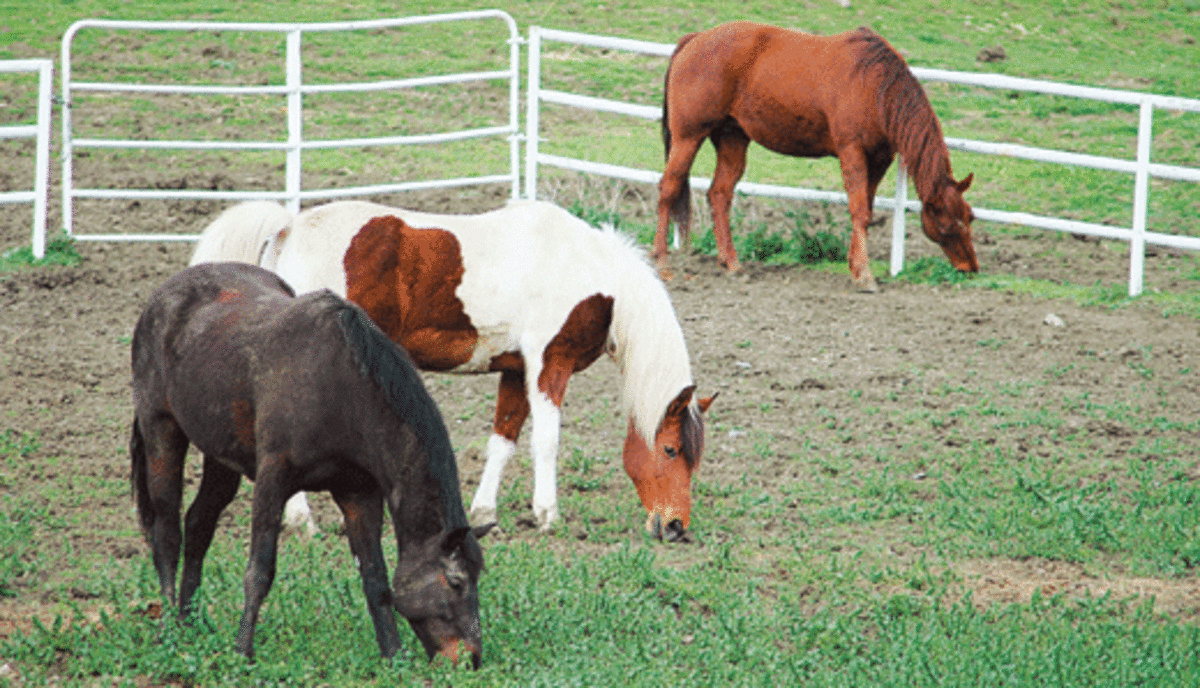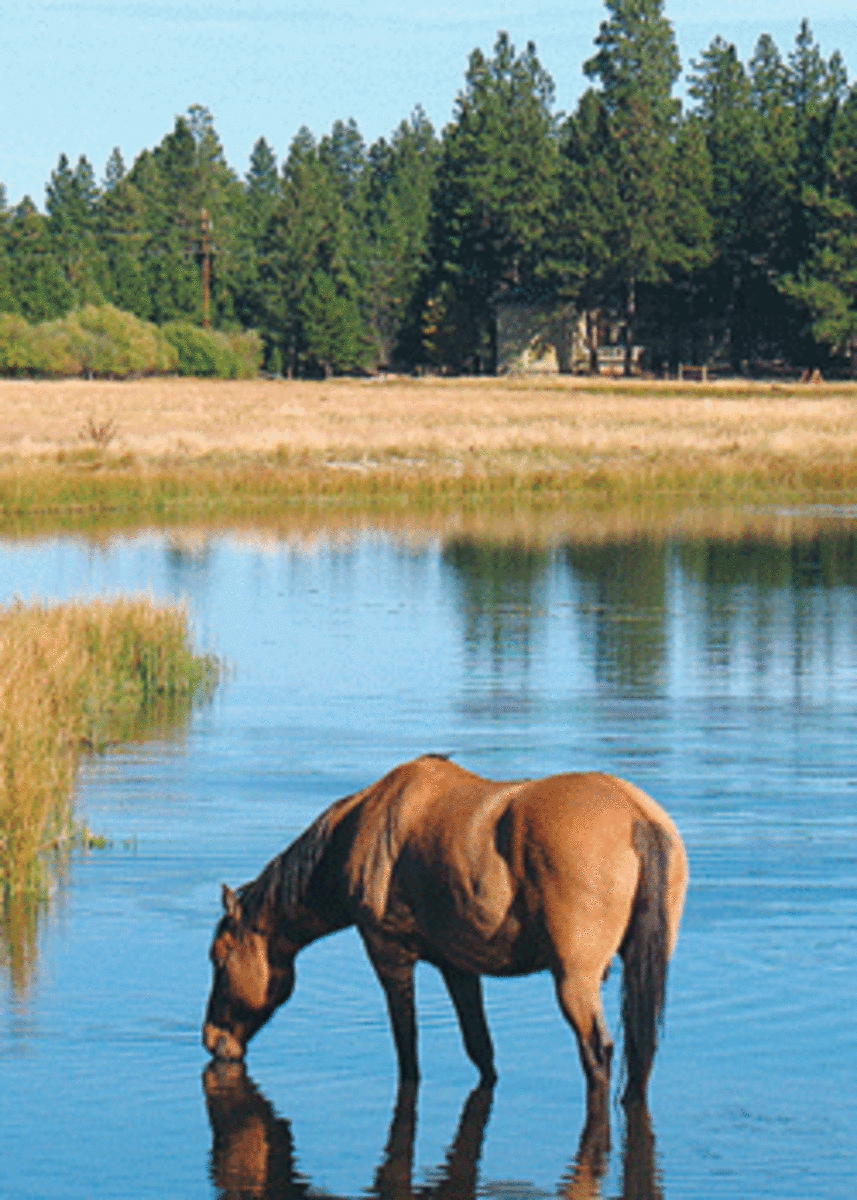
Your traveling horse needs optimal feed and water, whether you haul your horse across time zones or just a few hours away from home. A high-quality diet and ample water help your horse keep up his energy, fight travel stress, fend off disease, and avoid colic (a potentially life-threatening digestive disorder). Your horse also needs ample water to fight travel-related dehydration, due to decreased water intake while on the road.
[READ ABOUT: Traveling with Horses]
This in mind, I’ll first explain how to best manage your horse’s feed and water needs at home. Then I’ll explain the health risks that changes to his routine can pose when he travels. Next, I’ll give you a rundown of special on-the-road needs. I’ll also briefly explain signs of colic, and tell you what to do should your horse suffer an episode away from home.
At-Home Management
Your at-home nutrition routine will set a solid basis for meeting your horse’s on-the-road needs to minimize his colic risk. Here are five important guidelines.
Provide all-day feeding
Horses evolved to intermittently graze small amounts of fiber-rich plants (such as grass) for 13 to 15 hours per day. If you feed your horse two large meals per day, the lack of gut activity the rest of the time can lead to intestinal problems, such as colic or gastric ulcers. A large, twice-daily meal can also interfere with activity of intestinal microbes (bacteria and protozoa) that help him efficiently digest fiber. If your horse isn’t on pasture, feed him small meals throughout the day, or free-feed grass hay. He’ll perform better in all ways if his natural urge to nibble constantly is satisfied.
Feed good-quality forage
Feed your horse a diet with a minimum of 60 to 70 percent forage. Forage in the intestines provides a reservoir of fluid, energy, and electrolytes (essential salts lost in sweat). Feed good-quality hay, not too coarse or too fine. Avoid dust and mold. Only supplement hard-working individuals or difficult keepers (those prone to weight loss) with alfalfa hay and limited grain (see below) only as necessary and according to your veterinarian’s advice.
Minimize grain
High-grain diets increase colic risk by 3 to 4 times. If you feed your horse a large grain meal twice a day, he’ll have less water in his colon, which can result in dehydration of his manure. This, in turn, can lead to impaction colic (intestinal blockage).
Keep feed consistent
If you change your horse’s diet, you quadruple his chances of suffering a colic episode. If you’re running low on hay, blend a large proportion of familiar hay with a new source to allow his digestive tract to adjust to the different food.
Provide clean, fresh water
Water is the mainstay of your horse’s health. It enhances digestion and keeps his muscles working as they should. When idle, he drinks at least seven gallons of water per day just to maintain normal bodily function. For every pound of feed he eats, he needs two to four pints of water for digestion. Additional water is necessary for other bodily functions, including exercise. Always provide clean, fresh water, and let him drink at every opportunity.
Offer free-choice salt
Offer your horse a plain salt block or a bucket of loose table salt so that he can replenish some of the electrolytes lost in sweat. You may need to syringe or feed occasional doses of electrolytes if he’s sweated hard for a long duration while on a ride.
Schedule dental exams
Schedule yearly dental exams with your veterinarian. Proper dental care will enable your horse to grind feed well; the better he can chew, the better he’ll derive optimal nutrition from his feed.
[READ ABOUT: Equine Dentistry]
Minimize internal parasites
Internal parasites cause colic by reducing digestive efficiency and altering circulation to the bowel. Implement a regular deworming program, following your veterinarian’s advice. Regularly clean manure from your horse’s living quarters to minimize the load of parasitic larvae.
Travel Risks
When you travel with your horse, you take him out of his natural environment and place him in the most unusual of dietary situations. You may offer him multiple and new sources of hay, depending on the geographic location and the length of time you’re away from home.
Your traveling horse’s feeding schedule is disrupted. He’s removed from his familiar water supply, which can lead to dehydration. And he suffers stress. Taken together, these factors increase his colic risk.
You’ll compound the problem if you offer your horse large amounts of dry feed, and supplement his diet with grain or pellets, especially if he’s used to moist pasture grass. Dry, cured hay is only about five to eight percent water; grass pasture is 50 to 90 percent water. Grain is nine percent water.
The more dry feed you offer, the more water your horse needs to properly digest it. And water intake can be a problem if your horse is picky about his water supply.
During transport, your horse is also at risk for choke (an obstruction of the esophagus), especially if you feed him large pellets, concentrated feed, and/or coarse hay. However, any type of forage can cause choke, especially if your horse is dehydrated and lacks sufficient saliva to wet the feed.
If you take your horse on long, strenuous trail rides in the summertime, he needs to drink at least 20 gallons of water each day to stay hydrated and to perform at his best. When you ride him steadily in hot, humid weather, he can lose as much as 10 gallons of water in the form of sweat. (He may start to fade once he’s lost four gallons.)
On-the-Road Strategies
Here are 12 proven strategies to meet your horse’s feed and water needs during transport.
Transition slowly
If you need to change your horse’s diet, make the transition slowly over a couple of weeks before you leave. If you must feed pellets, use small size pellets to minimize choke risk, especially if your horse tends to bolt his food.
Plan an early arrival
Some say that a trailer ride is equivalent to your horse having walked all the way, in terms of energy expended and muscle fatigue. Plan to arrive early at your destination to give your horse a full day and night to recuperate, relax, and rehydrate before your ride.
Minimize dust
As your horse tugs on hay in a net or in a trailer manger, his lungs may be showered with dust, mold spores, and bacteria, which can cause respiratory problems. To minimize his intake of harmful particles, wet the hay copiously, and ensure adequate trailer ventilation. (Drive with open windows only if there are screens or use a fly mask; otherwise, road debris could harm your horse’s eyes.)
Feed high-quality hay
Feed your horse the same high-quality hay you give him at home. En route and at your destination, allow him to eat as much grass hay as he’d like.
Soak the feed
Before feeding, soak the hay in water (especially if you must feed pellets or coarse hay) to increase your horse’s water intake. Feed sloppy mashes of soaked beet pulp for fiber, which aids intestinal function.
Feed in grassy areas
If possible, feed in grassy areas to keep the feed free of dirt or sand, which will decrease your horse’s risk for sand colic.
Eliminate grain
Minimize, and preferably eliminate, feeding grain products. If your horse needs more calories, substitute high-fat feeds, such as rice bran, and oil.
Monitor manure
Monitor manure quantity and quality when on the road. Keep track of how many piles your horse makes throughout the day and night; mentally measure this against what you normally see him produce at home. If his manure production decreases or ceases altogether, this may foretell an impending impaction, even if he’s acting fine. (Also, make sure your horse’s manure doesn’t contaminate and soil his feed.)
Determine your horse’s water preferences
Some horses like tepid water; some like it cool. Also find out the type of water bucket your horse prefers. Experiment with plastic, rubber, and galvanized materials. Conform to these preferences to encourage your horse to drink.

Offer water on the road
Stop often along the road, at least every four hours, to offer your horse fresh drinking water. If he turns up his nose, allow him to relax for about 20 minutes, then offer water again. (Note: A horse traveling for 24 hours in hot conditions may drink less than half of their normal water intake even if he’s unloaded and offered water at four-hour intervals.)
Offer electrolytes
Electrolytes, particularly sodium, enhance your horse’s thirst drive and help balance his bodily fluids. To restore his electrolyte balance on the road, offer him a bucket of electrolyte-laced water in addition to plain water. Offer electrolytes in a mash (so the salts dissolve evenly in the water) twice on the day after you reach your destination. But beware of adding too much salt, which would increase dehydration if your horse isn’t drinking well. If your horse doesn’t sweat much during transport, he might not need electrolyte supplementation.
Offer vitamin supplements
Feeding your horse vitamins and antioxidants during and after transport will boost his immune system, which helps him fight disease. Vitamins B, C, and E are especially recommended for the traveling horse. Consult your veterinarian for an optimal supplementation program for your horse.
Is it Colic?
Colic (a digestive disorder) is the number-one horse killer. When you take your horse on trail-riding adventures, his risk of colic goes up, because his diet changes, his appetite is diminished, his water intake is likely to decrease, and he suffers travel stress.
Suspect colic if your horse doesn’t want to eat, or if he’s lethargic or depressed. More than a mild colic may elicit obvious signs of pain, such as looking at his flanks, pawing, rolling the upper lip, lying down, and/or rolling on the ground for more than a scratch.
If your horse suffers colic while away from home, first take his vital signs (pulse, respiration, temperature, dehydration, gut sounds, and gum color.) Then longe him at a vigorous trot for 15 to 20 minutes to see whether this relieves gas or an intestinal cramp.
If your horse doesn’t improve within an hour, load him in your trailer, and take him to the nearest veterinary clinic. (Locate nearby veterinary resources before you leave.)
Note: Giving medication to your colicky horse can mask serious signs of colic that requires surgery and put his life in jeopardy. It’s always better to get medical care as quickly as possible, or call a nearby veterinarian for advice.
Nancy Loving, DVM, of Boulder, Colorado, graduated from Colorado State University-Fort Collins with a special interest in equine sports medicine. After a lifetime of trail riding, she began endurance riding and became an endurance veterinarian at international competitions, as well as a team vet for the United States Endurance Squad. She’s authored hundreds of magazine articles, as well as four books. Her most recent book is All Horse Systems Go:The Horse Owner’s Full-Color Veterinary Care and Conditioning Resource for Modern Performance, Sport and Pleasure Horses.






